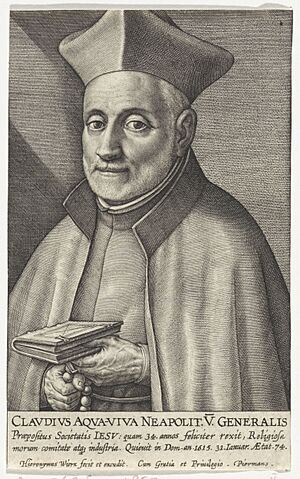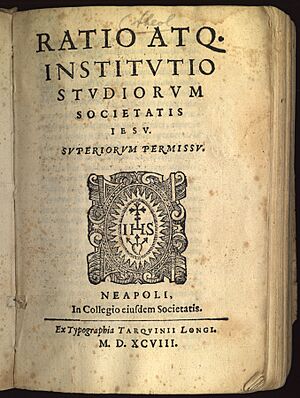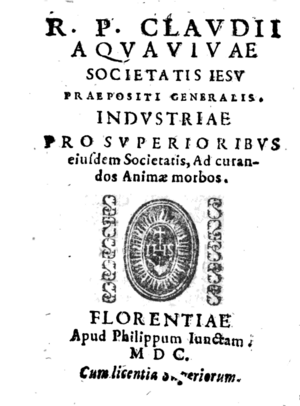Claudio Acquaviva facts for kids
Quick facts for kids
Very Reverend
Claudio Acquaviva
|
|
|---|---|
 |
|
| Born | 14 September 1543 |
| Died | 31 January 1615 (aged 71) |
| Occupation | Jesuit priest |
| Known for | being the second founder of the Jesuit Order and Superior General of the Society of Jesus |
Claudio Acquaviva (born September 14, 1543 – died January 31, 1615) was an Italian Jesuit priest. He was chosen in 1581 to be the fifth leader, or Superior General of the Society of Jesus, for the Jesuit Order. Many people call him the "second founder" of the Jesuits because of his important work.
Contents
Early Life and Joining the Jesuits
Claudio Acquaviva was born in Atri, a town in Abruzzo, Italy. His family was very important and well-known in Naples. They supported art and learning. Claudio studied many subjects, including Latin, Greek, Hebrew, Mathematics, and Jurisprudence (law) in Perugia.
He learned about the Society of Jesus (the Jesuits) from his friends, especially Francis Borgia. Claudio was very impressed by how the early Jesuits helped people during a terrible sickness in 1566. He decided to join the Order in 1567. With the support of Pius V, he asked Francis Borgia, who was then the leader of the Jesuits, to let him join.
After finishing his studies, Claudio quickly took on important roles. He was very good at managing things, which showed he was ready for top positions. He became the leader (called a Provincial superior) for the Jesuits in Naples and then in Rome. While in Rome, he even offered to join a Jesuit mission to England in 1580.
His nephew, Rodolfo Acquaviva, was also inspired by Claudio. Rodolfo joined the Jesuits at age seventeen, just a year after Claudio did. Rodolfo later became a missionary and died as a martyr.
Becoming the Jesuit Leader
When the previous Jesuit leader, Everard Mercurian, passed away in 1580, a big meeting was called. This meeting, known as the Fourth General Congregation, happened in February 1581. Claudio Acquaviva was elected as the next Superior General. He was only thirty-seven years old, which surprised many people, including Gregory XIII, the Pope at the time.
However, Claudio showed amazing leadership skills. He guided the Jesuits through many challenges. The Order grew a lot during his time as leader, with more members joining and more missions starting around the world. This proved that the people who voted for him made a great choice.
Claudio's Achievements as General
Claudio Acquaviva was a strong and wise leader. In his first letter as General, he wrote about how leaders should guide others with wisdom and care. He successfully stopped a disagreement among the Spanish Jesuits, even though the King of Spain, Philip II, was involved.
Later, some people questioned his leadership at another big meeting (General Congregation V in 1593). But Claudio was open and humble, and he won over the delegates. He came out of this challenge with his leadership fully supported.
He also had to deal with powerful leaders like Sixtus V, who was not friendly to the Jesuits. Claudio used his skill and courage to protect the Order. He also handled internal disagreements within the Jesuits, making sure everyone worked together.
During his time as General, the Jesuit missions grew even more. They expanded in places like India and Japan. New missions were also started in China by Alessandro Valignano. Claudio also helped set up missions in Paraguay and Canada. He encouraged Jesuit work across Protestant Europe, especially helping English Recusants (Catholics in England) during the time of Queen Elizabeth I.
The Ratio Studiorum
One of Claudio Acquaviva's most important achievements was publishing the Ratio atque institutio studiorum in 1599. This book was a guide for Jesuit schools. It brought together many years of experience in education and created a clear "Jesuit system of education."
This system was very important for how Jesuits taught students. It helped their schools become famous for their high quality of learning.
Fortiter in re, suaviter in modo
Claudio Acquaviva wrote a book called Industriae ad curandos animae morbos (which means "Curing the illnesses of the soul"). In this book, he shared a famous saying: fortiter in re, suaviter in modo.
This Latin phrase means "resolute in execution, gentle in manner" or "vigorous in deed, gentle in manner." It teaches that you should be strong and firm about what is right, but always act in a kind and gentle way when dealing with others. This saying has become a well-known motto for many groups and organizations.
Death and Legacy
Claudio Acquaviva passed away in Rome in 1615. When he died, the Jesuit Society had grown greatly. It had nearly three times as many members as when he started, with about 13,000 Jesuits in 550 houses and 15 provinces around the world.
The strong influence of the Jesuits during their "golden age" was largely due to Claudio Acquaviva's smart and long-term plans. He is remembered as one of the greatest leaders the Jesuit Society has ever had.
Images for kids
See also
 In Spanish: Claudio Acquaviva para niños
In Spanish: Claudio Acquaviva para niños
 | Misty Copeland |
 | Raven Wilkinson |
 | Debra Austin |
 | Aesha Ash |




